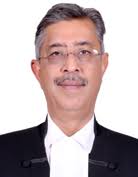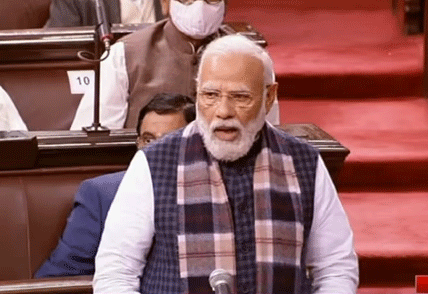
While the Prime Minister called for connecting the justice system tothe people and in the language understood by them to be able to distinguish between executive orders or judicial pronouncements, the CJI said he was receiving many representations for introducing local languages in the High Courts and the time has come now, to revisit the demand and take it to logical conclusion.
The practice of law before Constitutional Courts should be based on one’s intelligence
and understanding of law, and not mere proficiency in language, he said in this regard at a day-long joint conference of the chief ministers and HC chief justices in the Vigyan Bhawan here.
The CJI was also critical of the government not implemented by governments for years together, with the resultant contempt petitions becoming a new category of burden on the courts. “Deliberate inaction by the governments despite judicial pronouncements are not good for the health of democracy,” he warned.
He also accused the government of transferring the burden of deciding on policy matters despite them not being the judiciary’s demand. If a citizen comes to the court with a prayer to address his grievance, the courts cannot say “no.”
CJI Ramana said ambiguities in legislation also add to existing legal issues. “If the legislature passes a law, with clarity of thought, foresight and with people’s welfare in mind, the scope for litigation gets minimized,” he said.
“We need to encourage local languages in courts. This will not only increase the confidence of common citizens in the justice system but they will feel more connected to it,” Prime Minister Modi said.
addressing the joint conference of Chief Ministers and Chief Justices
of high courts here.
Referring to the Central government’s drive to repeal archaic and
obsolete laws, Prime Minister Modi said that in 2015 they had
identified 1800 such laws, out of which Centre has repealed 1450 laws
falling under its domain and of the laws to be repealed by the States
only 75 have been scrapped.
The Prime Minister appealed to Chief Ministers to repeal outdated laws
to make delivery of justice easier.
“In 2015, we identified about 1,800 laws which had become irrelevant.
Out of these, 1,450 such laws of the Centre were abolished. But, only
75 such laws have been abolished by the states,” he said.
Prime Minister Modi said as India celebrates the 75th anniversary of Independence, focus should be on creation of a judicial system which measures upto the expectation of people, where justice is easily available, is quick and for everyone, when we celebrate 100 years of independence in 2047.
The Prime Minister also spoke about nearly 3,5 lakh undertrial prisoners, mostly coming from weaker sections, or average family backgrounds languishing in jails. Referring to district committees headed by District Judges that reviews such cases, the Prime Minister urged the Chief Ministers and High Court judges to look into these cases on humanitarian grounds.
The CJI elaborated explosion of the cases in the courts:
“If a Tehsildar acts upon a grievance of a farmer regarding land survey, or a ration card, the farmer would not think of approaching the court. If a municipal authority or a gram panchayat discharges its duties properly, the citizens need not look to courts.
If revenue authorities acquire land through due process of law, the courts would not be burdened by land disputes. Apparently, these cases account for 66% of the pendency.
It is beyond my understanding as to why intra and inter departmental disputes of the Government or fights between PSUs and the government end up in courts.
If service laws are applied fairly in matters of seniority, pension and so on, no employee will be compelled to go to courts. It is a well acknowledged fact that the governments are the biggest litigants accounting for nearly 50% of the cases.
If police investigations are fair, if illegal arrests and custodial torture come to an end, then no victim will have to approach the courts.”
As regards concerns with the judicial system regarding delay in delivery of justice and pendency, the CJI said the judiciary should not be blamed if one looks at the websites of the courts on the huge workload of judges. The number of cases filed and disposed on each day is “unimaginable,” he said.
He also in this regard referred to the rising number of frivolous litigation and noted how the Public Interest Litigation (PIL) that served a public interest have turned into personal interest litigations and misused to stall projects or pressurise public authorities or used as a tool to settle political scores or corporate rivalry. He called for an introspection and contemplation solutions in this conference.
On the fewer judges in the High Courts, he underlined that out of 1104 sanctioned posts of High Court Judges, there are 388 vacancies. “From day one, it has been my endeavour to fill
judicial vacancies. We have made 180 recommendations for appointments in various High Courts during the last year. Out of this, 126 appointments have been made. I thank the Government of India for this. The High Courts have sent around 100 names to the Government of India. They are yet to reach us.”
VACANCIES AND HIKE IN CASES: CJI Ramana said at the time of the last conference in 2016, the sanctioned strength of judicial officers in the country was 20,811 which is now 24,112, an increase of 16% in six years. In contrast, pendency in district courts have gone up from 2.65 crore to 4.11 crore, which is an increase of 54.64%. He said this data shows how inadequate is the increase in the sanctioned strength.
From Our Bureau
NEW DELHI: Union Law Minister Kiren Rijiju on Saturday said the PM’s suggestion that courts should encourage local languages “requires wider consultation with judiciary.”
Addressing a joint press conference with Chief Justice of India N V Ramana after a day-long conference of chief ministers and High Court chief justices, Rijiju said: “The matter came into discussion in many stages. But we’re very positive about encouraging use of local languages in judiciary…Nothing stopping us from doing it. It’s a process which requires wider consultation with judiciary.”
“Use of languages in the court, not only the language for argument but for the order requires approval of the Chief Justice of India. That is why it needs a wider consultation. We will definitely have a very positive consideration in this matter,” the Union Law Minister added.
CJI Ramana had also said in his speech that “the time has come now to revisit the demand and take it to a logical conclusion.”




